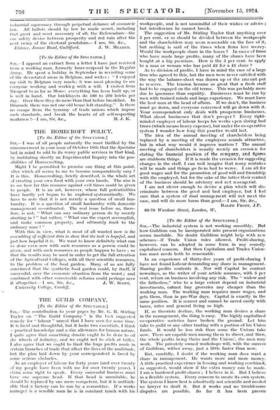THE GUILD COMPANY.
[To the Editor of the SPECTATOR.] Sia,—The contribution to your pages by Mr. G. R. Stirling Taylor on " The Guild Company " is the Lest suggested remedy for " labour " unrest that I have seen for some time. It is lucid and thoughtful, but. it lacks two essentials, I think —practical knowledge and a due allowance for huinan nature. [ quite agree that something drastic ought to be done to oil the wheels of industry, and We ought not to stick at trifles. I also agree'that we ought to. limit the huge profits made in certain branches of trade that affect the lives of the multitude, but. the plan laid dowii by your correspondent is faced by sonic serious obstacles. , As an employer of labour for forty years (and over twenty of my people have been with me for over twenty years), I claim sonic right to speak. Every successful business must have one supreine head. If. that head is unsuitable, he should lie ieplaced by one more coMpetent, but it is =think- able that a factory can be run by a committee. If a works Manager is a sensible Man- he is in constant .touch with his
workpeople, and is not unmindful of their wishes or advice ; but interference he cannot brook.
The suggestion of Mr. Stirling Taylor that anything over 5 per cent, or so should be divided between the workpeople and the shareholders may seem reasonable cn the face of it, but nothing is said of the times when firms lose money. Would the workpeople share in the losses ? In cases of firms who have made large profits, many of the shares have been bought at a big premium. How is the 5 per cent. to apply to a man or woman who has paid £2 for a £1 share ?
As to division of profits, I have in mind the case of a large firm who agreed to this, but the men were never satisfied with the way the balance-sheet was drawn up or the amount put to re serve. The tension became so great that a fresh staff had to be engaged on the old terms. This was probably more due to ignorance than cupidity. Businesses must be run by men with trained minds and large experience. We must have the best man at the head of affairs. If we don't, the business must go down, and everyone concerned will go down with it. Your correspondent only deals with prosperous businesses. What about businesses that don't prosper ? EVery right- minded employer of labour keeps his -works open during bad times (which means heavy expense), but under the co-operative system I wonder how long this practice would. last.
The idea of the annual meeting of shareholders being replaced by a meeting of the employees sounds attractive, but in what way would it improve matters ? The annual meeting of shareholders is usually merely an occasion for stating the financial position of the company, and figures are stubborn things. If it is made the occasion for suggesting changes in the staff, I can well imagine that many mistakes will be made and things go from bad to worse. I am all for good wages and for the promotion of good will and friendship with the employed, but for the sake of the latter their control of the business should be advisory and not managerial.
I am not clever enough to devise a plan which will dis- criminate between the good and bad employer, but I feel sure that a system of dual management will not meet the case, and will do more harm than good.—I am, Sir, &c.,










































 Previous page
Previous page